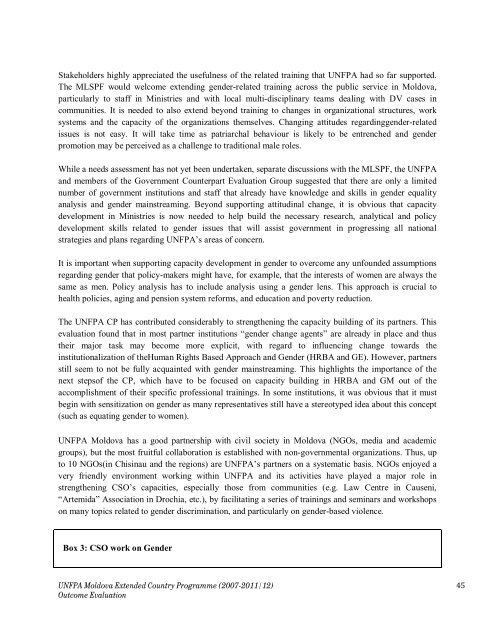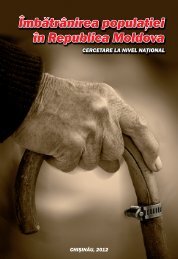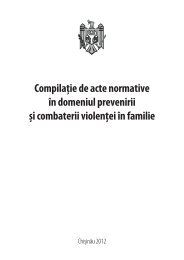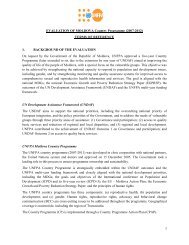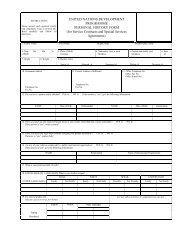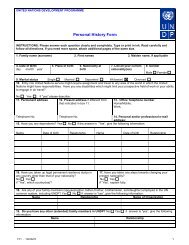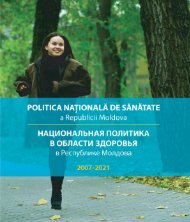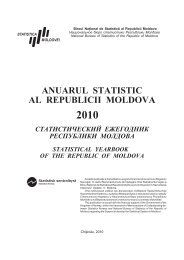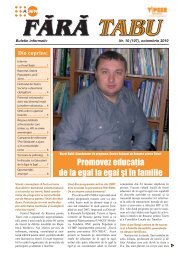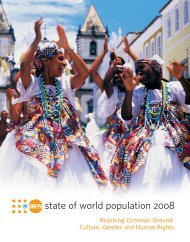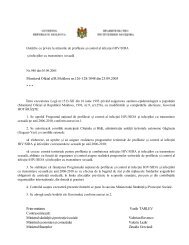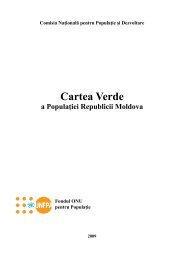Country Programme (2007-2011/2012) evaluation - UNFPA Moldova
Country Programme (2007-2011/2012) evaluation - UNFPA Moldova
Country Programme (2007-2011/2012) evaluation - UNFPA Moldova
You also want an ePaper? Increase the reach of your titles
YUMPU automatically turns print PDFs into web optimized ePapers that Google loves.
Stakeholders highly appreciated the usefulness of the related training that <strong>UNFPA</strong> had so far supported.<br />
The MLSPF would welcome extending gender-related training across the public service in <strong>Moldova</strong>,<br />
particularly to staff in Ministries and with local multi-disciplinary teams dealing with DV cases in<br />
communities. It is needed to also extend beyond training to changes in organizational structures, work<br />
systems and the capacity of the organizations themselves. Changing attitudes regardinggender-related<br />
issues is not easy. It will take time as patriarchal behaviour is likely to be entrenched and gender<br />
promotion may be perceived as a challenge to traditional male roles.<br />
While a needs assessment has not yet been undertaken, separate discussions with the MLSPF, the <strong>UNFPA</strong><br />
and members of the Government Counterpart Evaluation Group suggested that there are only a limited<br />
number of government institutions and staff that already have knowledge and skills in gender equality<br />
analysis and gender mainstreaming. Beyond supporting attitudinal change, it is obvious that capacity<br />
development in Ministries is now needed to help build the necessary research, analytical and policy<br />
development skills related to gender issues that will assist government in progressing all national<br />
strategies and plans regarding <strong>UNFPA</strong>’s areas of concern.<br />
It is important when supporting capacity development in gender to overcome any unfounded assumptions<br />
regarding gender that policy-makers might have, for example, that the interests of women are always the<br />
same as men. Policy analysis has to include analysis using a gender lens. This approach is crucial to<br />
health policies, aging and pension system reforms, and education and poverty reduction.<br />
The <strong>UNFPA</strong> CP has contributed considerably to strengthening the capacity building of its partners. This<br />
<strong>evaluation</strong> found that in most partner institutions “gender change agents” are already in place and thus<br />
their major task may become more explicit, with regard to influencing change towards the<br />
institutionalization of theHuman Rights Based Approach and Gender (HRBA and GE). However, partners<br />
still seem to not be fully acquainted with gender mainstreaming. This highlights the importance of the<br />
next stepsof the CP, which have to be focused on capacity building in HRBA and GM out of the<br />
accomplishment of their specific professional trainings. In some institutions, it was obvious that it must<br />
begin with sensitization on gender as many representatives still have a stereotyped idea about this concept<br />
(such as equating gender to women).<br />
<strong>UNFPA</strong> <strong>Moldova</strong> has a good partnership with civil society in <strong>Moldova</strong> (NGOs, media and academic<br />
groups), but the most fruitful collaboration is established with non-governmental organizations. Thus, up<br />
to 10 NGOs(in Chisinau and the regions) are <strong>UNFPA</strong>’s partners on a systematic basis. NGOs enjoyed a<br />
very friendly environment working within <strong>UNFPA</strong> and its activities have played a major role in<br />
strengthening CSO’s capacities, especially those from communities (e.g. Law Centre in Causeni,<br />
“Artemida” Association in Drochia, etc.), by facilitating a series of trainings and seminars and workshops<br />
on many topics related to gender discrimination, and particularly on gender-based violence.<br />
Box 3: CSO work on Gender<br />
<strong>UNFPA</strong> <strong>Moldova</strong> Extended <strong>Country</strong> <strong>Programme</strong> (<strong>2007</strong>-<strong>2011</strong>/12)<br />
Outcome Evaluation<br />
45


